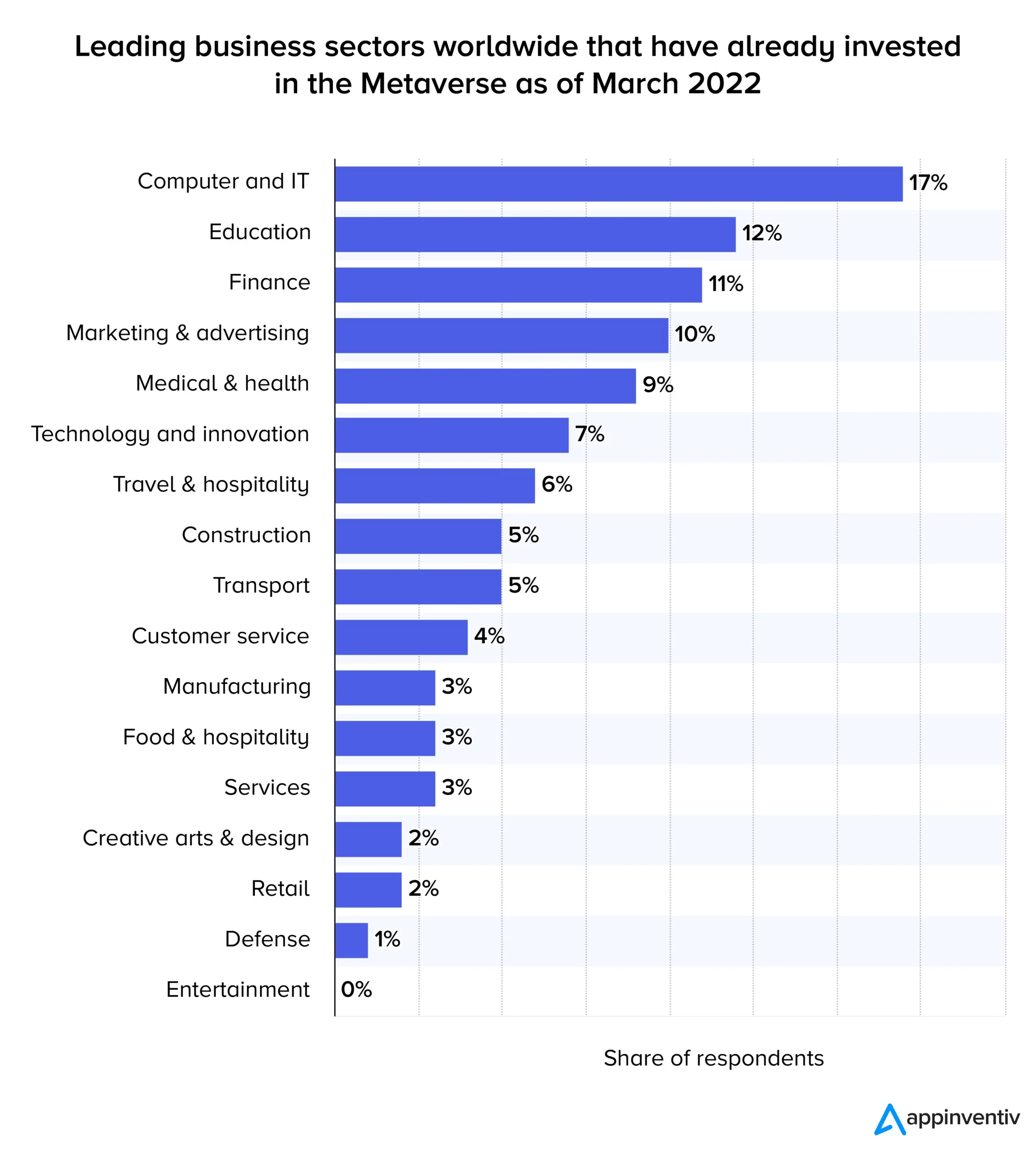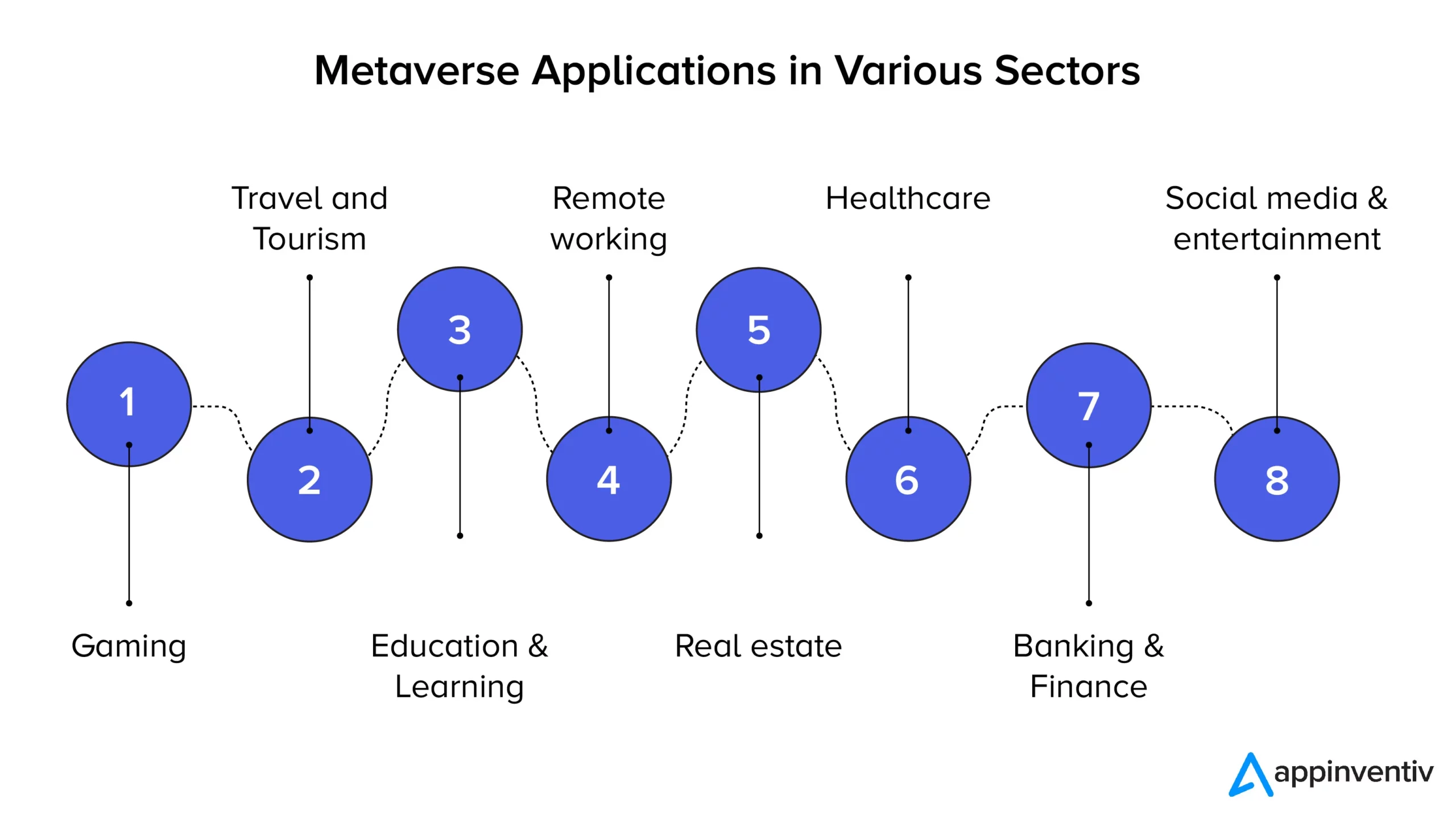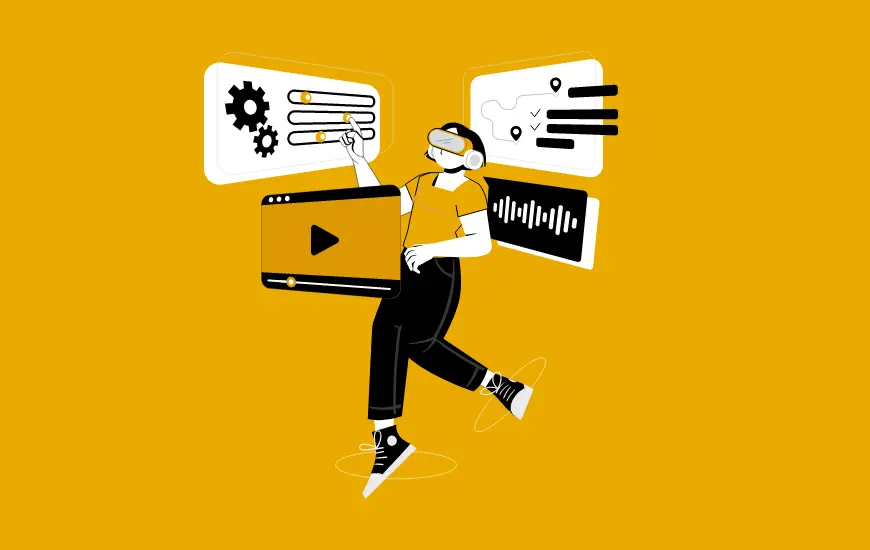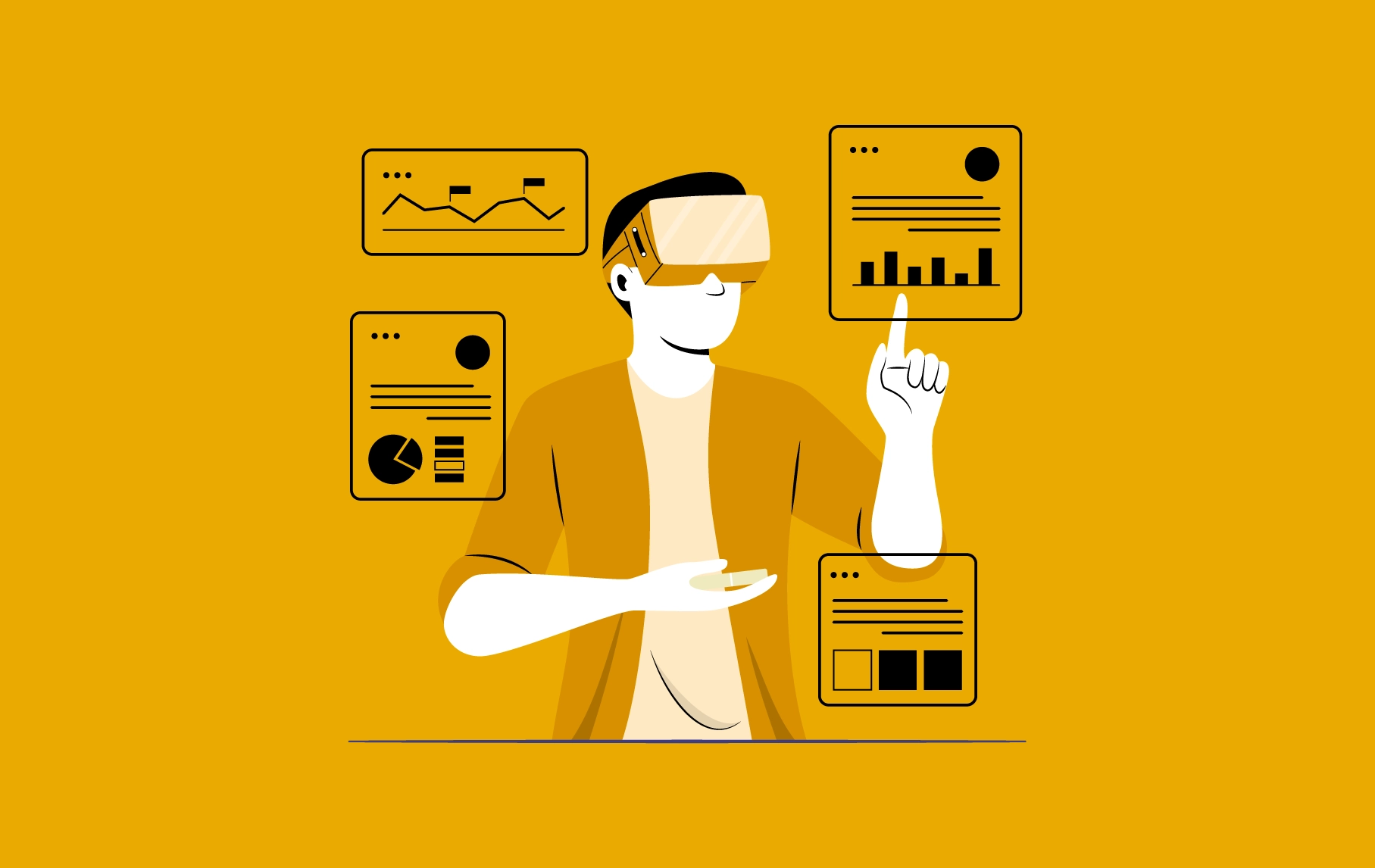- What is Metaverse exactly?
- What does Metaverse mean for businesses?
- Metaverse use cases in various Industries
- 1. Gaming
- 2. Travel and Tourism
- 3. Education and Learning
- 4. Remote working
- 5. Real estate
- 6. Healthcare
- 7. Banking and Finance
- 8. Social media and entertainment
- Top Metaverse benefits for businesses
- Engaged users
- Virtual event opportunities
- Sell and showcase products
- Innovative advertising
- Easy transactions
- How can Appinventiv help you with Metaverse development services?
With multiple iterations, the digital transformation continues to bring vast opportunities to modern businesses. Technology has come a long way from using static websites to navigating a web 2 experience for the global audience. Although the biggest shift in the chain of web evolution is brought by Metaverse.
The concept of Metaverse was initially coined by Neal Stephenson in 1992 which is now used as a mainstream technology in every possible industry. Even though Metaverse has stayed with us for more than a decade, it has become a buzz for digital enterprises since the pandemic. Post pandemic, every industry has been trying to establish on-screen communication which made businesses implement Metaverse use cases as means of new revenue source in the workflow.
What is Metaverse exactly?
Lets understand how Metaverse works with the help of an example. Imagine you have a pair of spectacles that can virtually augment your workspace in your room so you don’t have to be present anywhere physically. Your workspace will not be real but it will be very close to reality. The virtually augmented space will keep on getting real as the Metaverse technology advances.
Metaverse is a place where the hybrid and digital space co-exist. In straight terms, Metaverse is a three-dimensional web powered space based on AR (Augmented Reality) and VR (Virtual Reality). Users in Metaverse can come together in a digital universe and perform any given activity available. It is like a virtual interconnected space consisting of digital items, NFTs, avatars and a lot more.
The recent development in Metaverse also advocates that the technology can bring IoT (Internet of Things), AI (Artificial Intelligence) and holographic avatars to its arena. While these technologies are already driving businesses to success, the real question is, what does Metaverse mean to businesses? Let’s check out!
What does Metaverse mean for businesses?
Metaverse carries abilities to replicate the real-world using revolutionary technologies like AR and VR. Being the next iteration of internet and social media, Metaverse offers various business opportunities to enterprises worldwide.
For instance, In the coming realm;
- Metaverse is going to take the advertising to another level using unique storytelling experiences in 3D technology.
- The interoperable concept in Metaverse project helps businesses to conduct and enter any event digitally.
- Brands can interact with the global audience through Metaverse in the ecommerce business framework despite the geological barriers.
- Metaverse also supports digital wallets which means enterprises can regulate seamless transactions across its virtual ecosystem.
Metaverse benefits businesses in more ways than one. It is understood that every business will leverage Metaverse applications according to the business model and user specific needs. As per the recent survey of March 2022, more than 17% of the global IT enterprises have invested in the Metaverse. Meanwhile other industry sectors such as Education, Finance, Healthcare and Marketing are rolling to work with Metaverse between 9-12%.

The above figures have made the Metaverse implementation and popularity prominent in the business landscape. Now that we are familiar with its whereabouts, let’s determine some of Metaverse’s potential use cases and the myriad of benefits associated with it.
[Also Read: How is metaverse presenting new opportunities for insurance businesses]
Metaverse use cases in various Industries
As mentioned above, Metaverse is a broad concept. Metaverse applications are followed in every key area including education, gaming, tourism, healthcare etc. More than 40% of the AR and VR trends are already based on the Metaverse approach

So how about we take a look at some of the essential Metaverse examples and use cases applicable to different sectors:
1. Gaming
Gaming industry is said to be one of the core and primary investors of Metaverse technology. This technology allows players to interact with other participants within a single interoperable environment.
Popular games such as The Sandbox, Sorare and Axie Infinity are some of the successful Meraverse examples that are operating in the online gaming sector. Moreover, Axie Infinity currently possesses over 350,000 average active daily users and over 3 million monthly users. Besides that, Metaverse games have specific attributes that make the player’s experience special. Some of these include;
- A fully fledged social environment where every user stays connected. This distinguished Metaverse games from other VR games.
- Metaverse application games also offer the ability to play and earn cryptocurrency so the economic criteria is also satisfied.
- Metaverse architecture is compatible with in-game NFT assets where permanent ownership is specified.
- Metaverse provides a mixed reality experience where the players can smoothly switch between various formats of communication within the virtual world.
2. Travel and Tourism
Virtual tourism is one of the most forward looking use cases of Metaverse. Here, the technology lets you travel in a virtual environment which is a bonus point for users who cannot travel long distances. Experts claim that the Metaverse creation of immersive digital experiences with AR and VR is the biggest breakthrough in the travel industry.
With the 360° virtual tour, you can not only watch the location recorded but also be present digitally in the desired location with realistic effects.
A very popular instance is Thomas Cook launching the Virtual Reality Holiday “Try before you Fly” that helps the potential tourists to visit their desired destinations virtually.
3. Education and Learning
The education and learning potential of the Metaverse is as promising as its other applications. VR combined with effects of Metaverse has brought the learning experience to a qualitative new level. Students can now watch live experiments with more intensive and high quality knowledge resources.
A recent video in New York exhibits school students learning astronomy in a virtual spaceship rather than in a classroom. This is just the beginning of a new educational era. Metaverse also eliminates language barriers by allowing students from various countries to gain insights from a single digital space without social and linguistic complications.
Another Metaverse example is Mesh created by Microsoft which is a mixed reality platform where faculty, staff and students can interact using their 3D avatars. Mesh can be operated using Microsoft Hololens, a wearable AI to attend video conferences and live sessions.
4. Remote working
The massive shift in the traditional business model is brought about by the Metaverse. Many enterprises are already working under the Metaverse virtual business architecture. These virtual office enterprises include Nike, Intel, YouTube, McDonalds along with emerging startups like Gravity Sketch and Upland.
Another Metaverse use case in remote working is the VR training where the employees can be trained using a simulated experience. VR training is one of the primary Metaverse benefits that fuses corporate training with experiential training where the company workforce has access to videos, manuals, audios and various digital environments.
Other than metaverse training, remote working in virtual space, communication and collaboration of workforce using VR devices and remote meeting using 3D avatars are some of the most popular trends in the digital working space.
5. Real estate
One of the core features of Metaverse is its ability to offer the client an ultimate virtual reality experience. It’s no surprise that a market niche of real estate can be profitable with Metaverse.
With Metaverse property tour options, the realtors do not have to travel to the site, the clients do not need to waste time traveling to dozens of properties. Infact, the prospective buyers can take a Metaverse real estate tour and explore all possible options in real time.
Moreover, the virtual tour in Metaverse can be adapted to the client’s scale, taste and design. Real estate sector is also looking forward to investing in Metaverse app development specifically designed for the realtor’s needs and requirements.
6. Healthcare
Metaverse use cases in healthcare and have opened new channels for delivering treatments at low costs with improved outcomes. Telemedicine and Telehealth is a concept fueled by the Metaverse post pandemic where patients and doctors can interact in virtual 3D clinics.
Therapy is another Metaverse application where the patients can transport themselves to a relaxed digital environment in case of panic and anxiety.
New Metaverse applications are also healthifying the audience through digital workouts and exercises. Another reference is the Digital Twin technology, powered by Metaverse where a patient’s digital representation can be created to test treatments and medicines.
7. Banking and Finance
Metaverse use cases in banking are underrated yet flourishing and taking new heights. The banking metaverse gives a 360-degree overview of physical banks from any location. Even if you don’t have a VR headset, you can still access the Metaverse banking through your laptop or mobile device.
Metaverse is also the biggest advantage to banking from the perspective of Blockchain, NFT marketplace development and other DeFi cryptocurrency assets.
Experts claim that the Metaverse banking is a step above net banking where the customers can avail the same services with more personalized experience and data visualization.
8. Social media and entertainment
Metaverse for social media is a long running concept that has radically transformed online entertainment for audiences. Users have now started communicating using digital avatars and virtual clones.
On another instance, Facebook has already changed its name Meta which is an obvious sign of heavy business opportunities in the digital media space.
Similarly, Metaverse applications are implemented in sportswear, fashion and eCommerce industry, sports industry and hopefully soon in Manufacturing IoT and supply chain industry.
Since the technology is progressing to new landscapes and sectors, why not discover how businesses from different industries can benefit from Metaverse?
Top Metaverse benefits for businesses
Metaverse offers thousands of advantages to all sorts of businesses. The technology has created a parallel virtual world among the real word audience which was an unexpected dream a decade ago. Therefore, it’s crucial for modern businesses to explore possible Metaverse advantages and disadvantages in order to make informed decisions.
Some of the Metaverse benefits include;
Engaged users
Metaverse brings a whole new level of entertainment possibilities for online users. If your business is ready to introduce a Metaverse experience to your customers, there’s a possibility of gaining a more interactive and engaged audience for your brand. You have unlimited options to offer your customers from virtual goods to gaming adventures to AR/VR showrooms.
Virtual event opportunities
A live show of your favorite artist may not be as impressive on screen as in a Metaverse environment. You can even organize virtual events for your customers giving them a better feel of presence in their desired destination.
Museums and galleries can also shift on Metaverse radar to gain the popular traction they deserve. In a very recent event, an NFT avatar exhibition was conducted where 300 unique avatars were sold within a day.
Sell and showcase products
eCommerce brands and businesses are actively using Metaverse to let their customers try clothes, glasses, home furniture and everything in between with a better experience. Businesses can also set up stores and showcase their products and services virtually with a possibility of a large number of new customers added to target.
[Also Read: Building immersive experiences by Implementing Metaverse in eCommerce]
Innovative advertising
As mentioned above, Metaverse has introduced a new approach of brand storytelling to build innovative awareness and business identity. Matverse transforms storytelling and “story living” where the audience just won’t be a passive listener but an active participant making choices in your products.
Easy transactions
Cryptocurrency and Metaverse walk hand in hand. Today’s digital world asks for digital money which has become even easier with digital wallets and cryptocurrency. Users don’t need to link bank accounts in the Metaverse world and the payments are only a few taps away.
[Also Read: Web3 and the Metaverse: Building a Stronger Digital Economy]
The above use cases and benefits of Metaverse give us a broad understanding of what Metaverse is and how it works for businesses and enterprises. With time, Metaverse will be an immense part of our daily lives. While early prototypes of Metaverse are already under experiment for various sectors, it’s time for enterprises to take a step ahead and implement Metaverse technology for their business.
Bonus Read- Metaverse-as-a-Service platform – Unlocking new avenues for business
How can Appinventiv help you with Metaverse development services?
Appinventiv is a leading Metaverse development company that specializes in delivering top AR VR solutions to startups and establishments. Our Metaverse experts use top of the breed tools and techniques to craft an immersive virtual experience for businesses. With our agile and user centric development solutions, you can advance your core business goals and stand at the forefront of the competition.
Talk to our experts to understand how modern Metaverse technology aligns with your business objectives.



Building Virtual Worlds: How Digital Twins Power the Enterprise Metaverse
The metaverse is changing the online world. Just like Web 3.0, it's a game changer for businesses. Central to this change is Digital Twins, a leading-edge technology that makes the virtual worlds of the metaverse possible. The metaverse will likely be the next considerable economic power when the internet blends with real life. Estimates show…

Metaverse in Training: Top 7 Use Cases and Benefits
The concept of the metaverse in training is revolutionizing how we approach learning and skill development. Experts predict a growth in the metaverse education market to an impressive $24.7 billion by 2030, showcasing a 43.76% CAGR during the 2023-2030 forecast period. This surge in interest is not surprising, given the unique benefits and applications of…








